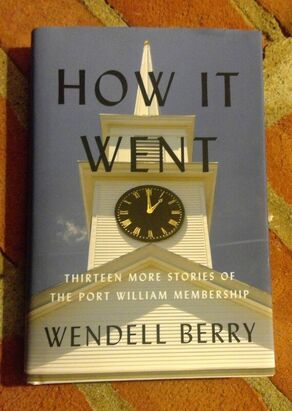 Driving down the road. Putting wet laundry in the dryer. Picking up a garden trowel. The quiet moment before falling asleep. A memory slips into your mind—their familiar whistle, particular look or smell, a phrase spoken…you remember and for a moment you re-member. The Port William Membership…if you don’t know what I’m referring to, it’s time to be introduced to Wendell Berry’s fictional town in Kentucky, its landscape and people. How It Went: Thirteen More Stories of the Port William Membership is his latest (and hopefully not last) book. I bought it for myself for Christmas and quickly read it, but like each of his Port William novels and short stories, they stay with me long after. Berry has a knack for describing the lived experience of the land and its people. Even if their particularities are not your particularities, you find yourself woven into their human experience. Stories of small town & farm-life, a barber and his shop, being a child or a parent during a world at war in the 1940s…they pull you in and draw you like a threaded needle into the fabric of your own life. With an ease that may surprise, you open your own memory box containing the people and places that have made you and many times, held you together. This particular book centers on an old man, a writer, looking back (like Berry himself). “Memories of times and places he had forgotten came back to him, reached him at last as if they had been on their way for a long time. He realized how fully and permanently mere glances, touches, passing words, from all his life far back into childhood, had taken place in his heart…” (p. 76). Andy Catlett remembers those no longer living and “yet by their absence his old companions have in a way come closer to him than they were when they were alive. They seem to involve themselves intimately in his life as he goes on living it” (p. 131). He sounds a lot like Saint John Chrysostom in the 4th century: “Those whom we love and lose are no longer where they were before. They are now wherever we are.” There are expressions of wit and wisdom that you have inherited. There are people whose presence, whether still with you in body or not, continue to bring comfort, encouragement, or perhaps curiosity! Pause for a moment:
___________________________ Just now as I finished writing, my son opened a can of sparkling water and the sound of his pouring it over ice took me back to childhood. I’m in 4th grade, pouring a cold glass bottle of Pepsi over ice and running it out to my mom who is push-mowing the front yard. I knew she loved the frothy fizz and wanted her to enjoy it that hot day. Although little fizz was left by the time she stopped and knelt down to drink it, I remember her look of appreciation, her joy in being remembered. To Get Started with Port William, look for these books: Jayber Crow Andy Catlett: Early Travels Hannah Coulter Nathan Coulter A Place in Time: Twenty Stories of the Port William Membership How It Went: Thirteen More Stories of the Port William Membership Kasey Hitt is a co-founder and instructor for Wisdom Tree Collective. She’s been a spiritual director since 2003 and has been reading Wendell Berry novels and poetry for just as long.
You can also find this blog and others from the Membership of Wisdom Tree Collective here.  Photo by Nathan Dumlao on Unsplash Two people in my life are facing a terminal illness. And here’s what else they have in common: gratitude. Every time I talk to them, whether a simple conversation or in spiritual direction, I am amazed at the depth of their gratefulness. Their faces light up. It is like their diagnoses gave them new eyes to see life. And they are overwhelmed by the beauty right in front of them. Even more so, they are overwhelmed by the peace of God inside of them. The windows of their souls reflect it in such delightful ways. “Every day I wake up so happy!” one exclaimed to me (without a single relationship or situation changing in their life). How is this possible? Much of it is pure gift. Grace. And some of it, I am sure, is because both have done inner work in the years leading up to this moment. They learned how to listen deeply to God and how to listen deeply to others. They entered into meditation and mindfulness. They learned to play and be playful. They sought out spiritual direction and a precious few others to accompany them along their inner journey. Now their outer journey reflects what they cultivated within. Awe. Humor. Peace. Kindness. Joy. (Just to name a few) I am honored to be a witness. They are teaching me a lot. One of their gifts is reflected in the Sufi poet, Rumi's words, “I saw grief drinking a cup of sorrow and said to it, ‘Tastes sweet does it not?’ Grief confessed, ‘You’ve caught me and ruined my business. How can I sell sorrow when you know it’s a blessing?’” If you have no idea how sorrow can be a blessing and if you do not wake up happy, maybe it is time for an inner journey of your own. There is so much to be grateful for in this life.  Photo by Damian Siodłak on Unsplash Photo by Damian Siodłak on Unsplash Choices can be difficult. Wanting to make the perfect one, I can struggle with “buyer’s remorse.” It can be about a purchase or any decision I have made or need to make (especially if others are concerned). Did I take enough time to make the best choice? What if I didn’t? Was I right? Was I wrong? I will replay the options. Especially if my choice does not please others, I will replay it even more. Sometimes it can become compulsive, stuck on a loop in my brain. We all have experienced the stress that comes from obsessive over-thinking. Over the years, I have tried a variety of ways to “throw a stick in the spokes” and stop the constant thought-cycle. The practice of Centering Prayer has been one thing that, gradually, has made a difference. Centering Prayer can be a challenge as one gets to discover all the places the unruly mind wants to wander instead of stay in the present (it is certainly not interested if the present has feelings it doesn’t want to feel!). As I have grown in acceptance of the brain’s (sometimes bizarre) escapades to do anything but feel reality and rest in God, I have grown in awareness of when I am joining its invitations to run away to the circus of compulsivity. Here are two simple ways of returning home:
The keys to both are patience and gentleness (two indicators or “fruits” of the Holy Spirit as described in Galatians 5:22-23). It may take a while, but with gentle persistence old compulsive paths will be less and less traveled. And relief will rise with your every return to the pathways of peace.  Spiritual practices, like meditation and even church-going, can become spiritual bypass—ways of bypassing reality both outside and inside of us, dissociating from wounds within and without, ignoring the healing work that needs to be done in our inner and outer world. But spiritual practices can also be vehicles for transformation of both ourselves and our world. How?—by giving us new ways of seeing and being (which is the whole point of authentic spiritual practice). Let’s take a look at a few practices... Conscious Breathing: With as little as 10 slow, complete exhales and 10 full, relaxed inhales, we can calm the fight, flight, freeze survival impulse, allowing us to move from a reactive, closed off, defensive place to a receptive, open, deeper place. Centering Prayer: Through daily practice of 20 minutes of silent surrendering to God’s presence & action, we let go of our ego-drivenness and receive inner healing of compulsions and soul wounds. Not only does this bring personal freedom but it releases us from projecting our compulsions and wounds on others and passing them down to our children. Lectio Divina: Spiritual reading allows a word or phrase in a small portion of inspired text, whether sacred Scriptures like the Psalms or a poem, to speak to us. Rather than bringing what we already know or studying it, we allow the text to study us! As we bring our story, our lives, to it, we humbly listen for the wisdom and guidance being offered (which may be encouragement to see a counselor or write a letter to your senator!). Awareness Examen: Looking over our lives at the end of the day through the eyes of God helps us become aware of God’s life-giving presence and action (and the times throughout the day when we were unaware or resistant). The patterns of what is life-giving and life-draining help us discern who we are and what we are to offer this world. Silent Retreats: Extended time in silence and solitude creates space for our souls to rest and play which opens us to better hear the “still, small voice” which may be drowned out by the external noise of daily life or the internal noise of comparing ourselves to others. There are so many practices I could list here but the point isn’t the practice itself, it’s the “fruit.” Seated meditation may not fit you. You may desire some kind of moving meditation, like dance or qigong. Or you may prefer to spend time in nature or doing art. What practices have you found that cultivate love in you? What helps you have eyes to see and tend to the suffering both inside yourself and in others? Which ways of wisdom help you discern what is yours to offer this world (not out of compulsion but compassion)? A Spiritual Director can companion you on this journey of discovery of spiritual practices. But remember, it’s not necessarily the practices, it’s the humans who are transformed by these practices, that this world needs. What do spiritual practices like Centering Prayer offer a hurting world?—YOU! 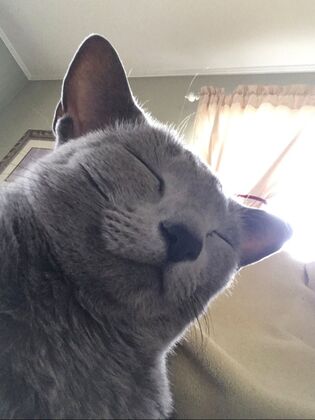 My Russian Blue cat, Birdie, on my lap during Centering Prayer My Russian Blue cat, Birdie, on my lap during Centering Prayer Cats should be the mascot of contemplation. They have resting awareness down. Some people think contemplation is laziness, but this is far from the truth. “Doing nothing so God can do everything” is hard work! It takes an active, yet relaxed, vigilance to stay present rather than follow the mind into the past or future where regret and worry reign. But like a good Zen master, the cat can teach us. "Every single creature is full of God and is a book about God. Every creature is a word of God," Meister Eckhart proclaimed in the late 13th century. I find this to be true as I spend time with my cat. Listening and watching with the ears and eyes of my soul, I discover she has a lot to teach me. Here's some advice she offers... 5 feline tips for contemplation (also known as "contemplative catnaps"):
Cats make contemplation look simple. While simple, it can be challenging. Surrender and serenity are daily exercises that may look different each day! A routine-loving cat still changes nap spots, so how do surrender and serenity look for you today? Watch a cat for a while and allow the Spirit of God, which enlivens both you and the cat, to speak to you through this furry part of Creation.  Saint Meinrad Archabbey at sunset Saint Meinrad Archabbey at sunset I was supposed to be traveling today to Saint Meinrad Archabbey for a yearly 4-day Silent Retreat. It's one of my favorite places. I am always excited about facilitating this deep dive into the gift of Silence. Words don't do it justice. BUT the pandemic threw a wrench in my (& everyone's) plans. So, I decided that even though I won't be facilitating a retreat, I can share with you the theme that I picked out for it last year and we can enter into it wherever we find ourselves. We can still pray: "Make me an instrument of your peace." If there's ever been a time to pray this prayer that was written in the spirit of Saint Francis of Assisi, 700 years after his death by Father Esther Bouquerel of France in 1912, it is now!
Lord, make me an instrument of your peace Where there is hatred, let me sow love Where there is injury, pardon Where there is doubt, faith Where there is despair, hope Where there is darkness, light And where there is sadness, joy O Divine Master, grant that I may Not so much seek to be consoled as to console To be understood, as to understand To be loved, as to love For it is in giving that we receive And it is in pardoning that we are pardoned And it's in dying that we are born to Eternal Life Amen. ________________ "Blessed are the peacemakers," said Jesus, "for they will be called children of God." To be a peacemaker does not mean:
To be a peacemaker means we not only pray and enjoy peace, but we actively work for peace. For everyone. Not just ourselves. However, receiving inner peace enables us to extend outer peace...hence, the silent retreats. Silence offers an opportunity to slow down, to quiet the outer voices that we may look within and discover the inner voice of the God of Peace. Will you join me in reflecting, meditating, walking, dancing, stretching, playing, singing, resting, and working with this prayer over the next 4 days? Praying it first for yourself and your internal world: Lord, make me an instrument of your peace toward myself... Then praying it for those outside of yourself. Praying it on behalf of not only your family and nation, but the whole world. Praying to embody the words as you come in contact with the world--from those in your own house to the grocery store and social media. Let's breathe in and out the words of the "Prayer of St. Francis" and in so doing, may we become instruments and children of the God of Peace. 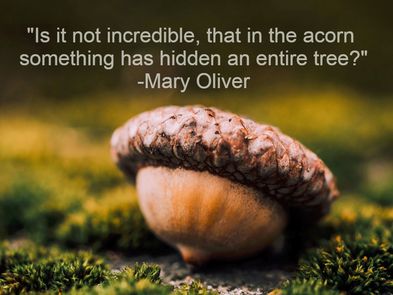 "Look deep into nature, and then you will understand everything better." -Albert Einstein This may very well be one of the reasons Jesus prayed outside so much! Whether on a mountain or on the side of one, in the wilderness, desert, or garden, Jesus found quiet places in creation to be alone with God the Father. He also encouraged people to observe nature to discover the deeper messages and invitations of God, instructing them to "notice how the lilies grow" or "look at the birds in the sky." (Matthew 6:25-34) All of nature is speaking! Whether individual parts or the rhythms and cycles of creation, if we observe using all of our senses and spend some time reflecting, we can discover what nature knows. With notebook or journal in hand, you might try the following prayer exercise and see what the Spirit of God has to say to you about your particular worries, stresses and concerns. What wisdom for your life is to be discovered in a single acorn or the falling leaves? Find out! How would you describe your November and December?
Now shift your attention from your own experience of November and December to nature's experience.
Give thanks for God's gift of (and the wisdom found in) nature! If there's a way to bless and care for creation, do it!  You may not be ready to go on a silent retreat or sit in 20 minutes of meditation, but how about trying a taste? It's easy. And since it's the season of pumpkin everything, let's try tasting silence through a slice of pumpkin pie! If you're not a fan of pumpkin pie, think of another food or drink you really enjoy. Now if you have a real slice of pie, great! If not, imagine tasting that first bite. Notice the flavors, texture, and temperature on your tongue. Allow yourself to savor the next few bites without rushing. What do you notice about the pie (or whatever you're savoring) that you may have missed if you had hurried through each forkful? Food and drink can rarely be savored when speed is involved, the same is true with silence. How do we taste and savor silence? With our ears. Ready to give it a try?
What do you notice now that you did not notice before you stopped and listened? Where did certain sounds come from, which ear did you hear them through? What sound most grabbed your attention? If in a quiet place, did you notice the sound of your own breathing? What was it like to do nothing but listen? How did your mind and the rest of your body respond? This is being present. It's a meditation practice. And yes, it counts. True, it's a great way to enter into a silent retreat or centering prayer meditation but if it happens to be the only spiritual practice you consistently engage this week or this month, that's fine! Just taste and see how pausing to listen and savor the sounds around you affect your soul. You never know, the next time you stop and savor the silence, you, like the prophet Elijah, may hear God's voice in a gentle whisper!  A poem I wrote right after a time of listening prayer six years ago. It recently came to mind as I was thinking about meditation. Meditation can calm the mind. In doing so, perhaps it offers an opportunity for the soul to remind us of what it's known & trusted since we were ages five and one! God, I pray that Lainey and Alex come to know You They already do. Okay God, then I pray they come to trust You. They already do. Then God, help them not to forget. (Pause) Amen. 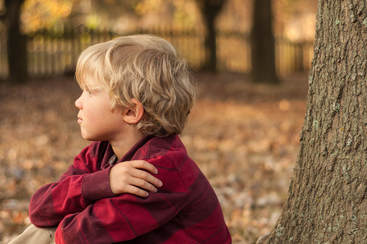 My son was angry about getting family photos taken. This probably isn't far off from the way I looked on my own rage-filled day when I finally admitted all my ways of prayer had stopped "working." My son was angry about getting family photos taken. This probably isn't far off from the way I looked on my own rage-filled day when I finally admitted all my ways of prayer had stopped "working." A poem written in 2013 about what led me to meditation & other contemplative practices years ago. All my old ways of finding God kept failing And one rage-filled day I stopped trying Sat down wondering if I was worth finding Let go of seeking and began trusting And breathing. Many are the ways seeming right to a man I started recalling My ways kept putting me in charge of the finding who the Psalmist found futile escaping. |
AuthorKasey is a scarf, ball and club juggling spiritual director just outside of Nashville, TN. Play helps her Type-A, Enneagram 1 personality relax, creating space for poetry and other words to emerge. She also likes playing with theological ideas like perichoresis, and all the ways we're invited into this Triune dance. Archives
January 2024
Categories
All
|
By clicking “Sign up for E-News” I consent to the collection and secure storage of this data as described in the Privacy Policy. The information provided on this form will be used to provide me with updates and marketing. I understand that I may modify or delete my data at any time.
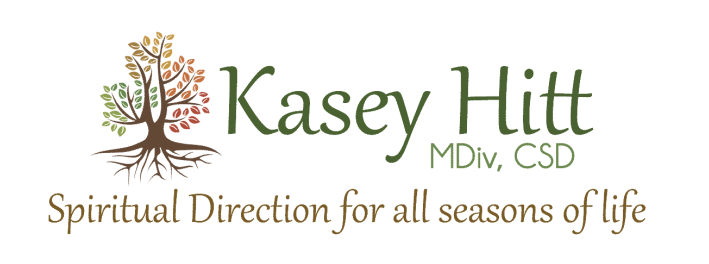
 RSS Feed
RSS Feed

